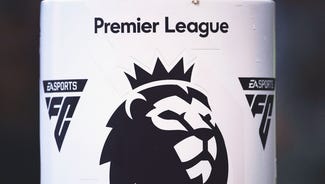
APNewsBreak: Study finds huge wealth gap in European soccer
A study commissioned by UEFA to aid in the debate over the future of the Champions League shows the financial and talent gap between the top five European leagues and the other 50 leagues on the continent is growing.
The destabilizing effect of the power of the "Big Five" leagues — England, Spain, Germany, Italy and France — is set out across a 50-page study by accounting firm Deloitte marked "private and confidential" and obtained by The Associated Press after being presented to UEFA's Professional Football Strategy Council in Monaco.
The data shared with key European soccer officials is certain to fuel the heated debate over the future of the Champions and Europa Leagues heading into key meetings of clubs next week in Switzerland. The divisiveness of the discussions led to UEFA, European soccer's governing body, to call off a meeting that was also scheduled for next week involving clubs and leagues. UEFA President Aleksander Ceferin believes they are not "ready for a meaningful discussion."
The "Polarization in European Football" report was commissioned by UEFA in June during the increasingly fraught talks involving leagues and clubs over attempts to overhaul the format of European competitions from 2024. UEFA initially presented the idea of reserving 24 places for clubs in the Champions League to return the following season, but it has since backed off the proposal because it has left some of the biggest leagues at odds with their best teams.
Changes to the format are being pursued by the top clubs to ensure them more games against each other and guarantee inclusion in lucrative annual tournaments without qualifying. One of the most powerful figures in the fight is Andrea Agnelli, who has wielded his power as head of the European Club Association and is chairman of Italian champion Juventus, Ronaldo's team.
The biggest leagues have pushed back, saying changes that would limit the opportunities for teams to earn a place in the European competitions such as the Champions League devalue their leagues.
The European Leagues group has worked to divide the elite, perennial trophy winning clubs from their less prosperous counterparts.
One of the most recent leagues to publicly denounce the ECA was the Czech Republic, which said their clubs agreed it was "inappropriate for European football bodies to create plans that would alter the structures, calendar and competitiveness of the domestic game."
The wealthy Premier League clubs offered support with a rare joint statement in June that highlighted the "obligation to maintain the health and sustainability of domestic league football."
Caught in the middle is UEFA, who is using the study to help support its claim that it is the only European soccer body that distributes funds across the continent. The report shows how the top leagues are monopolizing the best players and the cash of broadcasters.
Some key findings:
— The Big Five accounts for 74 percent of the 19.7 billion euros ($21.7 billion) generated by leagues across the continent, up from the 68 percent 10 seasons earlier.
— Forty-Seven teams account for 60 percent of the revenue generated by all 720 clubs in the 55 nations assessed by Deloitte.
— The attractiveness of the Big Five league matches on television could at least partially account for a drop in stadium attendances this decade across the 45 lowest-ranked leagues by revenue.
"To meet broadcast demand, the Big Five match calendar has increasingly been spread to collectively cover the weekend from Friday through to Monday nights to ensure live Big Five games are always available to watch in non-Big Five markets," the report said. "Meanwhile, most leagues in Europe have seen a decline or little or no growth in matchday attendances."
— The Big Five leagues banked 97 percent of the 2.4 billion euros ($2.6 billion) generated in non-domestic broadcast revenue by all European leagues in the 2017-18 season.
Rights holders in the other 50 European nations paid 430 million euros ($474.3 million) to show matches from the Big Five, accounting for 18 percent of the Big Five's international broadcast revenue.
"Nothing is coming back in my country," Romanian federation president Razvan Burleanu recently told the AP, referring to money Romanian broadcasters pay to screen league games from abroad. "This can be an idea to contribute to decreasing the gap between top-five leagues and the rest."
UEFA argues it is doing just that, sharing the revenue from European competitions.
While generating 373 million euros ($411.4 million) from broadcasters in countries beyond the Big Five, UEFA distributed more than double that to clubs in the 50 bottom-ranked countries.
The Big Five also profited but to a lesser degree: UEFA gave them around 150 million euros ($165 million) on top of the fees those markets paid for Champions League and Europa League games, taking the total to around 1.3 billion euros ($1.4 billion).
The Big Five redistributes some of their revenue domestically to lower divisions, but Deloitte highlights how they "do not make direct solidarity payments to other European leagues."
— The report also shows how the Big Five has increasingly been a magnet for foreign talent, with more than a fifth of the players in those leagues coming from the rest of the continent last season.
No country was impacted more than the Netherlands, which lost 50 players to the Big Five — a rise of 61 percent since the 2007-08 campaign. European champion Portugal is next on the list, with 49 players lost.
The struggle keeping players at home is particularly acute for Belgium and Austria. They have experienced around a three-fold increase in the number of players going to the Big Five in a decade.
The report does not touch on the players who benefit from Big Five salaries and the chance to win the biggest trophies.
— Transfers fees are not significantly filtering across the European game, with 67 percent of transfer spending — or 3.5 billion euros — circulating within the Big Five last season compared to 56 percent — or 1.4 billion euros — in 2007-08.
Non-Big Five leagues only receive 18 percent of the transfer spend, down from 23 percent in 2007-08.
"Only the Big Five leagues in aggregate are profitable," Deloitte concluded to UEFA. "Operating losses have increased across all other tiers, in aggregate, since 2007-08."






































































































































